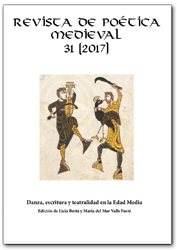"Danzare per Fantasmata", or the Embodiment of the Immaterial in Fifteenth-century Italian Dance Discourse
DOI:
https://doi.org/10.37536/RPM.2017.31.0.58477Keywords:
Fantasmata, Domenico da Piacenza, Pose, MemoryAbstract
Within Italian fifteenth-century texts on court dancing we encounter the fairly elusive expression «danzare per fantasmata». It has been connected with the powers of the imagination and the techniques of memory, in relation to both the performers and their audiences. It seems suggestive of some ghost-like experience. It is introduced in the key source, Domenico da Piacenza, with extraordinary images, suggestive of a moment of absolute stillness, soon followed by a swift flight. The relevance of this stylistic category on Renaissance dance aesthetics has undergone recent re-evaluation; so would deserve its implications for the time and space perceptions of dancers and onlookers alike.
Downloads
Métricas alternativas
Downloads
Published
How to Cite
Issue
Section
License
The opinions and facts stated in each article are the exclusive responsability of the authors. The University of Alcalá is not responsible in any case for the credibility and aunthenticity of the studies.
Authors will retain the rights on their work, even if they will be granting the journal a non-exclusive right of use to reproduce, edit, distribute, publicly communicate and show their work. Therefore, authors are free to enter into additional, independent contracts for non-exclusive distribution of the works published in this journal (such as uploading them to an institutional repository or publishing them in a book), as long as the fact that the manuscripts were first published in this journal is acknowledged.
Works are published under the terms stipulated in the Attribution-NonCommercial-ShareAlike 4.0 International License (CC BY-NC-SA 4.0) that allows third parties to share the work under the following conditions:
Attribution — You must give appropriate credit, provide a link to the license, and indicate if changes were made. You may do so in any reasonable manner, but not in any way that suggests the licensor endorses you or your use.
NonCommercial — You may not use the material for commercial purposes.
ShareAlike — If you remix, transform, or build upon the material, you must distribute your contributions under the same license as the original.










